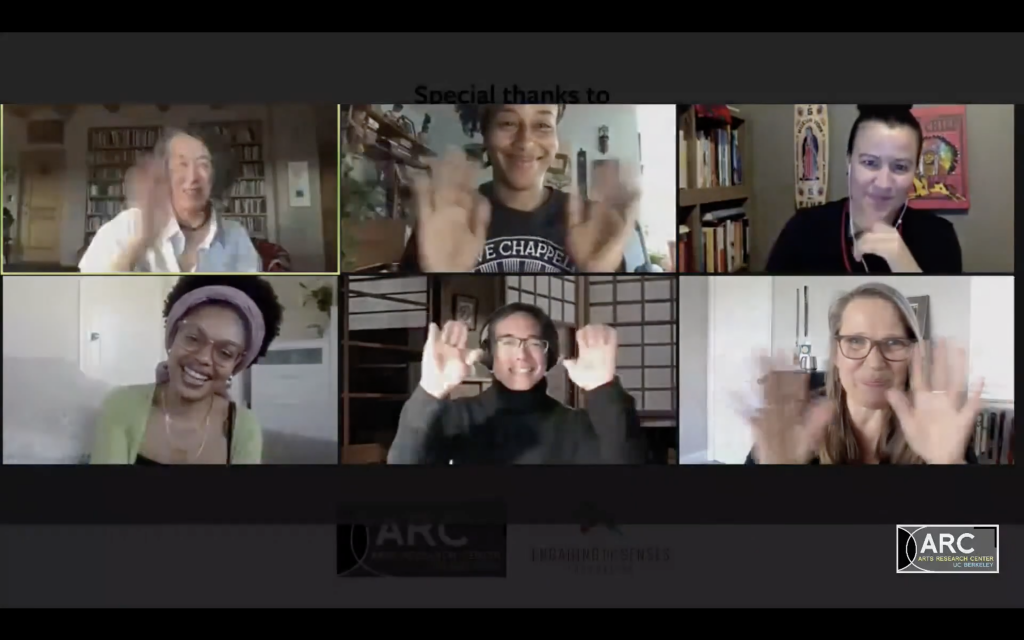Poetry Reading featuring Mei-mei Berssenbrugge, Natalie Diaz, and Aja Monet
By: Menat Allah El Attma, April 12, 2021
How does my body make room for
another who perceives my senses?
—Mei-Mei Berssenbrugge

We begin with the body, no way around it. Our bodies form cohesion and, from that, shape. And it is how we write into the subject, into the very person that allows us to (re)evaluate meanings of the mutable self and refigure the body—first, to which it belongs and second, through which it performs or enacts memory. In conversation, Mei-mei Berssenbrugge, Natalie Diaz and Aja Monet make clear the power of writing trauma, ancestry, and community. Together, these poets open wounds, guiding us to find our own—carnal and motivating.
Settler colonial states, erected from indigenous ethnic cleansing, will never oppose sibling states as it would jeopardize their own legitimacy to exist. All settler-colonial violence is interdependent because it aspires to replicate, realize, and then protect the same structures of erasure. “A disaster that doesn’t seem so natural”, Monet writes. “Pain is a rattlesnake whispering sweet nothings of forever, the end gazing back at you.” Little were/are colonists acquainted with the senses, how the body resists and preserves. To read body as place is to reveal its bonds and ruptures, a thing accumulated and held by communities. The workshop is “a liberatory space”, Monet reflects. Poetry through relationships is a disposition to effect a way of being in the world, a way in which we find each other and become ourselves. “I can be me if I understand that I am a consequence to what’s around me,” adds Diaz.
Language is not one’s body but an iteration of it that performs differently in the throat than in the mouth or the ears, Diaz continues. “And I push [language] to its excess so that it can possibly hold the many… so that I can be possible.” Resounding language shifts the body against structure, to move past boundary of meaning and begin anew. For Berssenbrugge, possibility is one of “tendrils”, something appendage-like that stretches out and twines around. When such tendrils are strung around your communities, it expands insofar that it makes even the impossibility worthy of you. “Care is a voice with hands trembling courage… Care is intentional like poetry pouring out anyway,” shares Monet. Community, like poetry, is generous: holding tension and the “all-ness” of you. So lean in. Lean in with your hands. Lean in with your tongue. Lean in with your head. Lean in with your whole body, your wholeness. And lean close.
Until LANDBACK Manifesto is materialized—that is, a reclamation of stewardship and everything stolen from original Peoples including land, language, ceremony, medicines, and kinship—we are not free. Our bodies carry in memory the struggles and triumphs of all oppressed Peoples. Our bodies carry many others, before and after us. In community, we seek liberation and embodied sovereignty through an organizing, political and narrative framework. And in poetry, we resist.
ARC Fellow Reelaviolette Botts-Ward asks, to you redirected, “What are you remembering? And who is asking you to remember them?”
The full recording of the event is available for viewing on our YouTube channel, here.
Menat Allah El Attma is an Egyptian Muslim woman, educator, writer, and visual artist. Menat graduated from UC Berkeley with a BA in English literature and is pursuing her teaching credential. She is a logophile and linguaphile, working to affect a similar love for words/languages in her students through the practice and art of storytelling. She believes art is in the telling of the story as much as the story itself.
